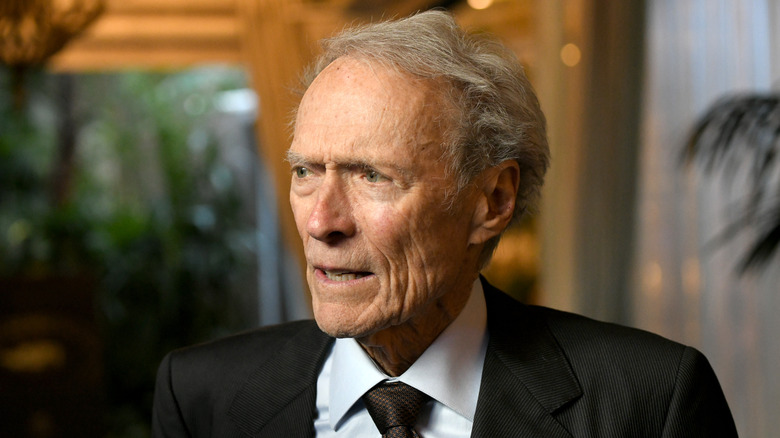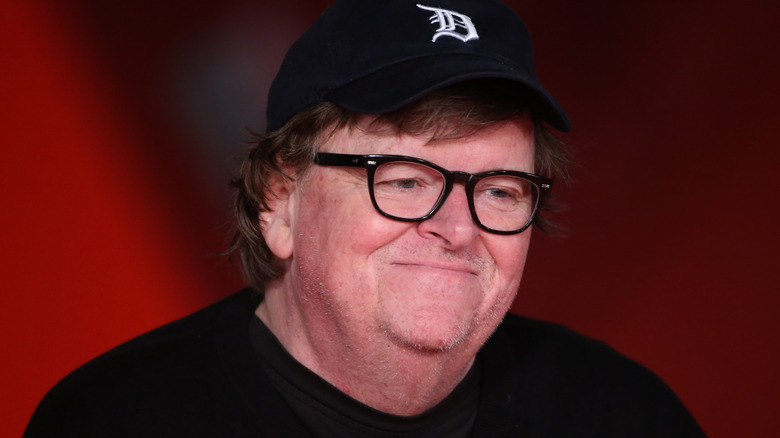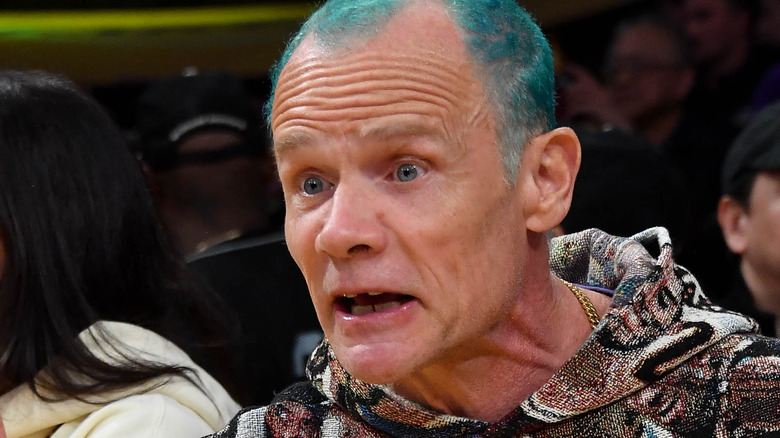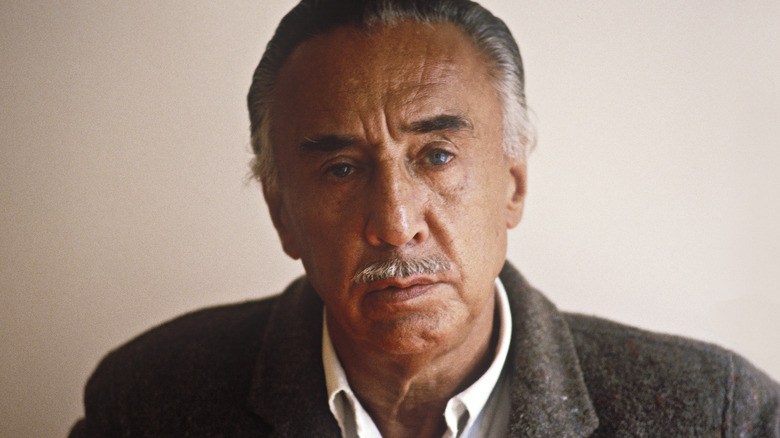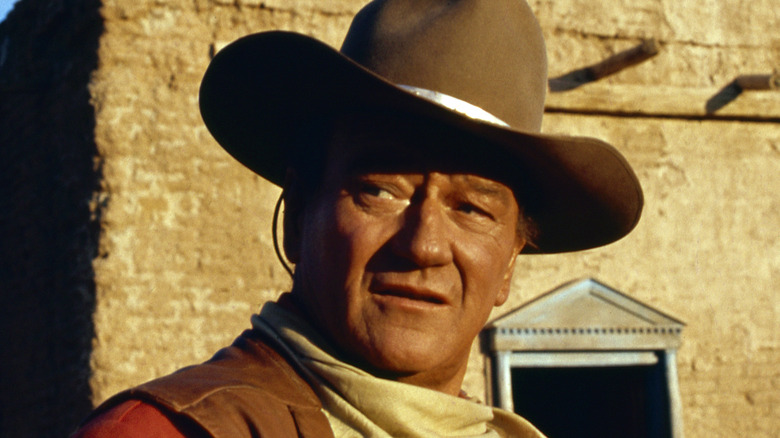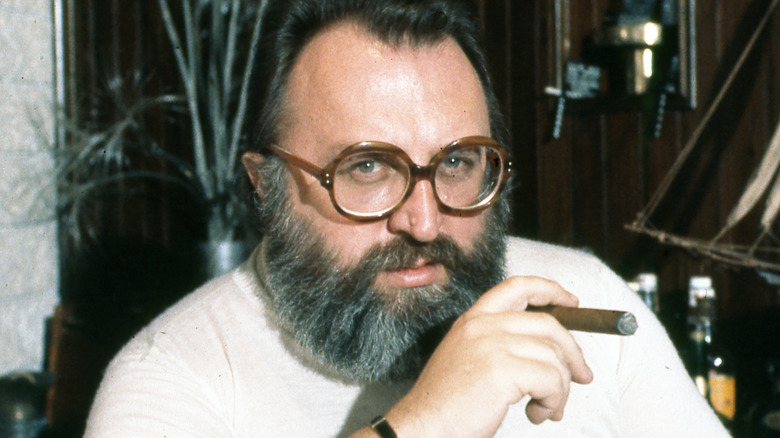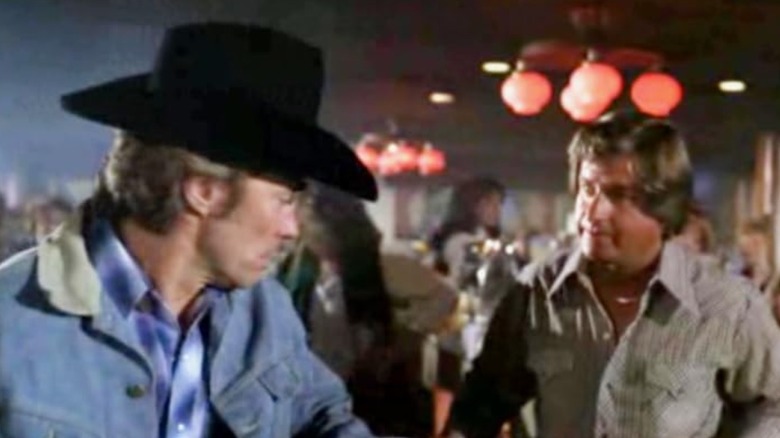Stars Who Can't Stand Clint Eastwood
He's a two-time Academy Award-winning director (and two-time Best Actor nominee) with numerous box office hits to his name, so there's no doubt that Clint Eastwood is objectively popular and has been for a long time. It might be hard, therefore, to believe that the man has detractors. But Eastwood has certainly encountered and encouraged those haters. Over the past 70 years or so, the A-list actor turned prolific director has seemingly made almost as many enemies as he has films.
Onscreen, whether he's starring in westerns, war movies, romances, or comedies, Eastwood is an intimidating figure, but seemingly more so in real life. Eastwood, a man with a philandering past and significant power in Hollywood, isn't afraid to say exactly how he feels about most anything. And yet a few of those with whom he's crossed paths came to regret it, and figuratively or literally stood up to the star of "Dirty Harry" and "Unforgiven." Here are all the people who have discussed their unique run-ins, of both a personal and professional nature, with Clint Eastwood, explaining how they came to just not like the guy that millions of movie fans love.
Michael Moore
Michael Moore makes provocative nonfiction films. "Bowling for Columbine" focused on American gun culture and became a documentary that helped change the world , while "Fahrenheit 9/11" was a polemic about Republican President George W. Bush. Standing in the opposite corner to Moore is Clint Eastwood, who is a strident supporter of Republican causes.
In January 2005, according to Moore's Facebook, both filmmakers attended the National Board of Review awards dinner. That evening, Eastwood addressed the crowd and threatened to "kill" Moore should the documentarian ever ambush-interview him, the way he does in his documentaries. "I'll kill you," Eastwood reasserted, right to Moore. The audience laughed, and Eastwood yelled to be heard. "I mean it. I'll shoot you." Moore elaborated: "I should probably stop here and say that I like Clint Eastwood and I think he was a great filmmaker. ... But something started to go haywire with Clint in the last decade."
Ten years later, after Eastwood's "American Sniper" proved a box office smash, Moore discussed the subject matter on X, formerly known as Twitter. "My uncle killed by sniper in WW2. We were taught snipers were cowards. Will shoot u in the back," Moore wrote. After media outlets picked up Moore's comments, he took to Facebook to explain himself, claiming to be talking about snipers in general, and not necessarily Eastwood's "American Sniper." However, he did still critique the movie. "Too bad Clint gets Vietnam and Iraq confused in his storytelling. And that he has his characters calling Iraqis 'savages' throughout the film."
Flea
In a 2016 interview with Esquire, Clint Eastwood tacitly approved Republican then-presidential candidate Donald Trump. "I haven't endorsed anybody," Eastwood clarified after praising the controversial businessman and reality TV star for what he thought was a refreshing attitude. "He's onto something, because secretly everybody's getting tired of political correctness, kissing up. That's the kiss-a** generation we're in right now. We're really in a p**** generation," Eastwood said. "We see people accusing people of being racist and all kinds of stuff. When I grew up, those things weren't called racist." As for the racially charged remarks Trump made on the campaign trail, Eastwood remained unfazed: "Just f***ing get over it. It's a sad time in history."
When the Esquire interview hit newsstands and the internet, detractors spoke up, including Flea, bassist for the Red Hot Chili Peppers — a band with their own tragic, real-life story. Offended by Eastwood's remarks and dismissal of problematic speech, Flea turned the movie star's own words against him. "Hey Clint Eastwood count me in as a p**** as we aspire to evolve above racism," he wrote on X, formerly known as Twitter (via Billboard) in a tweet that was later deleted.
Romain Gary
In 1968, the musical western "Paint Your Wagon" began filming in eastern Oregon. With a story about a young woman (Jean Seberg) set to marry a significantly older man (Lee Marvin) but who falls in love with his younger gold-mining partner (Clint Eastwood), life imitated art. Seberg and Eastwood, both married to other people, began a romantic relationship. The Hollywood gossip machine found out and reported on it, prompting Seberg's significantly older husband, France's consul-general to Los Angeles, and celebrated author, Romain Gary, to visit the set for a confrontation. Seberg admitted to an attraction, and an incensed Gary challenged Eastwood to a physical fight that was more akin to a duel. Gary wanted to fight Eastwood in the set kitchen, at sunrise, and with their fists as the weapon of choice.
Eastwood refused to participate, fearing that the scrap, or any injury he suffered therein, could hold up production of "Paint Your Wagon," a costly financial proposition. Gary went home and worked on his novel "White Dog" while Seberg filed for divorce, assuming Eastwood would do the same and end his marriage. He didn't.
John Wayne
In many ways, Clint Eastwood picked up where John Wayne left off. In the 1940s and 1950s, Wayne was one of the most bankable movie stars around, portraying Old West figures and war heroes. Eastwood made his name doing much the same in the 1960s and beyond. But Eastwood took the western into new ground with 1973's "High Plains Drifter." Unlike Wayne's westerns, with the upright heroes and seething villains blatantly and simply differentiated, the characters in Eastwood's films were morally ambiguous — a little bit good, a little bit bad, and a little bit selfish. In other words, Eastwood's version of the western was gritty, dark, and realistic.
After the critically-acclaimed "High Plains Drifter," Eastwood considered making another brooding western called "The Hostiles," and he offered a leading role to John Wayne, a man with his own dark side. The older actor passed via a written response: He didn't want anything to do with "The Hostiles," because he thought Eastwood was ruining the western, or at least disrespecting his preferred style of western.
"John Wayne once wrote me a letter saying he didn't like 'High Plains Drifter,'" Eastwood told film critic Kenneth Turan in 1998 (via The Telegraph). "He said it wasn't really about the people who pioneered the West. I realized that there were two different generations, and he wouldn't understand what I was doing." Eastwood replied to the letter with a rewritten script of "The Hostiles," which Wayne took out onto his boat and tossed into the ocean.
Sergio Leone
Clint Eastwood starred in three loosely connected westerns for director Sergio Leone: "A Fistful of Dollars" (1964), "For a Few Dollars More" (1965), and "The Good, the Bad, and the Ugly" (1966). All three are critically adored and held up by critics as some of the best westerns ever produced. Leone and Eastwood nearly made one more western in the '60s: "Once Upon a Time in the West."
Leone described the film to Eastwood, who couldn't understand one of the script's more complicated moments. He also didn't like how Leone envisioned the movie as an ensemble piece, meaning Eastwood would have to share top billing. He passed on "Once Upon a Time in the West," and Eastwood's role went to Charles Bronson.
By 1984, Leone realized that he didn't care for Eastwood's stoic acting style, on display in those '60s westerns. "If you think about it, they don't even belong to the same profession. Robert De Niro throws himself into this or that role, putting on a personality the way someone else might put on his coat, naturally and with elegance, while Clint Eastwood throws himself into a suit of armor and lowers the visor with a rusty clang," Leone told American Film (via Scraps from the Loft) in 1984. "Look at him carefully. Eastwood moves like a sleepwalker between explosions and hails of bullets, and he is always the same — a block of marble."
Fritz Manes
Clint Eastwood and Fritz Manes met as teenagers in the 1940s, and about 30 years later, they became film industry associates. Through the 1970s and 1980s, Manes worked on 13 movies — either as a producer, united production manager, assistant director, stunt performer, or a small-part actor — all of them Eastwood projects. The collaborations, and Manes' career in Hollywood, ended with "Heartbreak Ridge," a film about America's often-forgotten three-day war with Grenada.
Manes' purpose during that film was to serve as an emissary between the production and the U.S. Marine Corps, whose assistance the film required. Military officials, the Marines, and the Department of Defense all publicly disowned Eastwood's movie for bungling many factual details. Eastwood blamed Manes for all of it, and terminated his employment at his production company. Manes later said in Patrick McGilligan's "Clint: The Life and Legend" that working with Eastwood had always been difficult. "With this guy, if you got any credit for anything it was a miracle."
Manes also discussed in McGilligan's book how he allegedly witnessed Eastwood physically assault his first wife, Maggie Johnson. "Clint just turned round and knocked Maggie out cold. He really decked her, knocked her clear from the living room into the tub in the bathroom," Manes said (via the Irish Independent). For that passage, among others, Eastwood filed a $10 million libel lawsuit. "Clint Eastwood is not only an icon in the entertainment industry, but he is also a family man," the actor's lawyer, Marshall Grossman, told Variety.
If you or someone you know is dealing with domestic abuse, you can call the National Domestic Violence Hotline at 1−800−799−7233. You can also find more information, resources, and support at their website.
